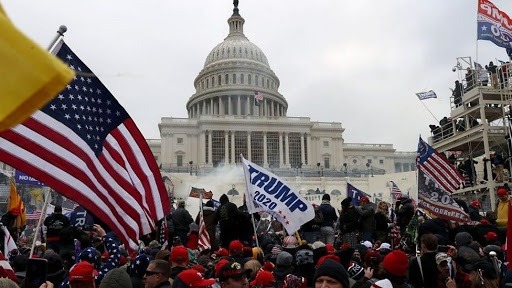Amir Ali Abolfath, speaking in an interview with the website of the Strategic Council on Foreign Relations, commented on the fact whether the United States has become bipolar after the recent elections and that there is not merely one bipolarity but rather a large number of dipoles in the US.
Abolfath described different types of bipolarity in the United States as follows: The dipole between the people and the government, the dipole between the elite and common people, the dipole between the conservatives and the liberals, the dipole between the liberal administration and state administrations, the dipole between the white and colored people, the dipole between the rich and the poor and the dipole between the globalists and the patriots. Therefore, in the United States, there are different types of dipoles that did not come into being overnight and have existed even in the past.
Regarding the current dipole, he said: With the coming to power of Biden administration and the ouster of Donald Trump, we are witnessing that bipolarity has intensified in the United States; but it is not clear how long these dipoles will last, because the nature of human societies is the creation of these dipoles.
Saying that Donald Trump’s supporters could be divided into different poles, he said: For example, some of Trump’s supporters are from among the elite and some are from among the masses. Some are among the rich and some are among the poor. Trump also has supporters from among both the whites and the colored people.
He went on to point out that the current bipolarity in the United States could not be divided into the bipolarity of Trump’s supporters and opponents, adding: Reducing the issue of social divisions to day-to-day politics is not very helpful.
He continued: Among Trump’s supporters, there are groups that economically believe that taxes should be reduced, that entrepreneurs should increase their activities, and that there should be more employment. Therefore, there are groups that support tax cuts for the rich. In the meantime, some institutions, figures and think tanks are in favor of this point of view, while the other side believes that the tax of the rich should be increased and this money should be distributed among the low-income groups in order to complete social justice. This group believes that this will make the workers have more income and purchase and thereby reduce unemployment.
Referring to the two think tanks in the United States, Abolfath said: Supporters of tax increase for the rich are often on the side of Bernie Sanders.
He further remarked: On the issue of identity, some of Trump’s supporters believe that American identity should be preserved, and that the United States is defined by its European descent, which includes the whites and the Protestants, but Trump’s opponents believe that American society is a multiracial and a mosaic society and that all races should be involved in the affairs of the society and in the administration. They believe that American power stems from its racial diversity, and if this racial diversity is stopped, it will eventually lead to the decline of the United States.
Referring to the fact that in foreign policy and security positions Trump has also supporters and opponents, Abolfath said: Some of Trump’s supporters believe that the administration has no right to violate the privacy of citizens, and that espionage activities that are being followed after 9/11 should be stopped. For those people, freedom takes precedence over security, but the other group believes that in the post-9/11 era, security requirements necessitate the administration to reduce social freedoms to some extent and invade privacy of individuals in order to ensure security of the society.
The expert, noting that the United States has been made up of different groups with conflicting points of view, said: Each of these groups also includes the social body, think tanks, institutions and prominent personalities.
In reply to the question whether the recent events in the United States will cause damage to the soft power of that country, he said: Clearly, recent post-election events have undermined the role model of the American political system.










0 Comments